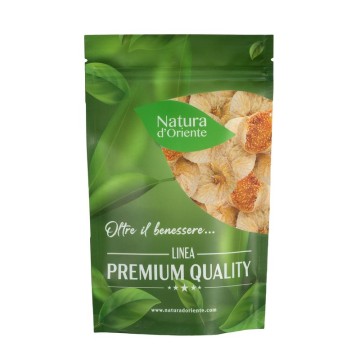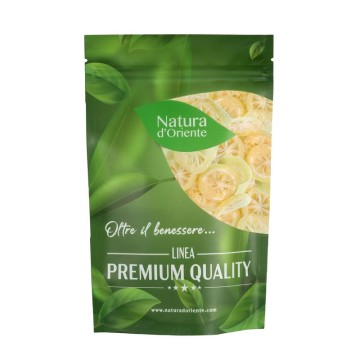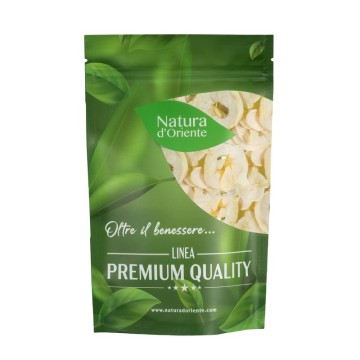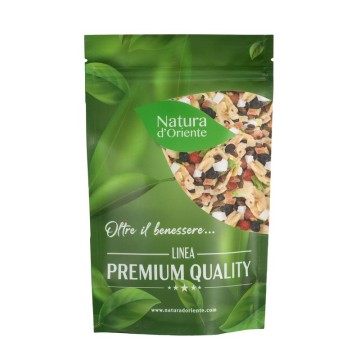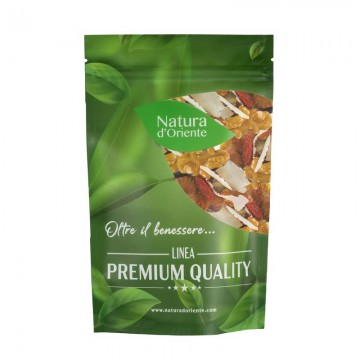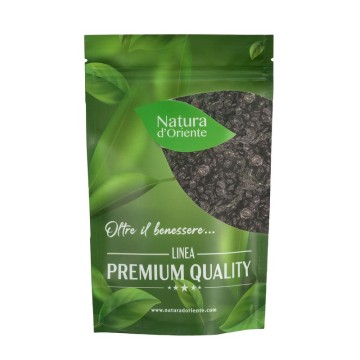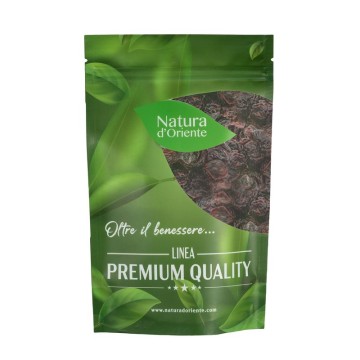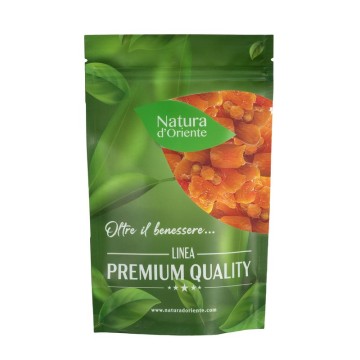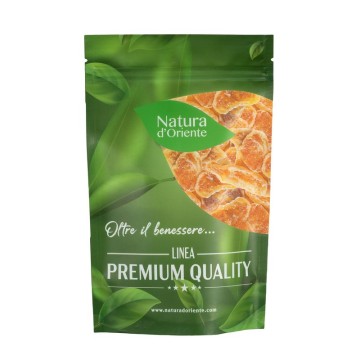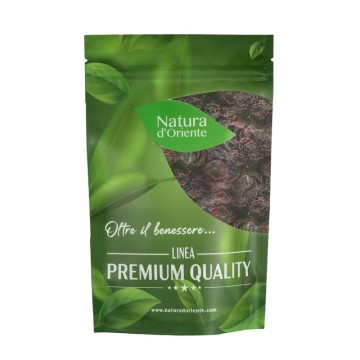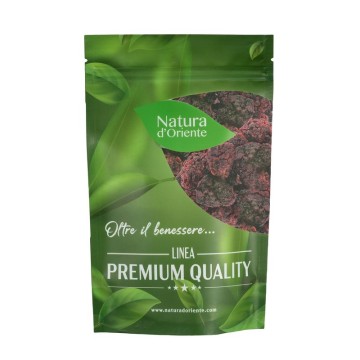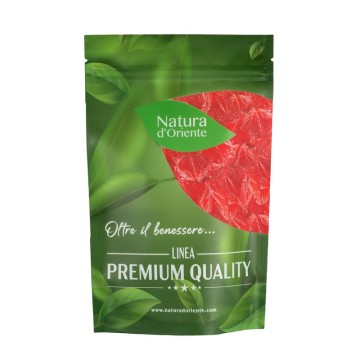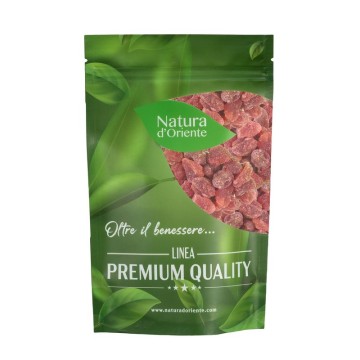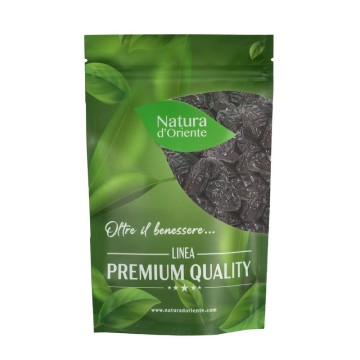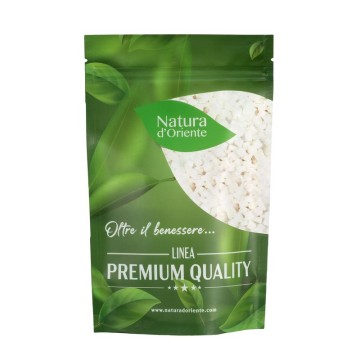Dehydrated peaches in wedges
Peach is a delicious and refreshing fruit, which can be found at different times of the year (especially in summer) and is surprising for its nutritional richness. When this fruit is dried, some of its nutritional benefits increase ...
Dehydrated peaches: properties and benefits.
Dehydrated peach is an ideal fruit when we need an extra energy intake , thanks to its high content of sugars, minerals and vitamins.
Its consumption is recommended for sportsmen , especially when they practice intense and long-lasting physical exercise: by athletes, to hikers who can occasionally benefit from these dehydrated peaches in wedges.
Dry peaches stand out, in fact, for their excellent carbohydrate content and provide interesting amounts of beneficial substances for our body. Contains vitamins (provitamin A, vitamin B3 or niacin and some amounts of vitamin C) , as well as making available minerals such as potassium, iron, calcium and magnesium, and beneficial fibers - soluble and insoluble .
Provitamin A or Betacarotene, which is converted in our body into vitamin A, becomes essential for the well-being of sight, skin and hair. It also performs beneficial support functions for the bones and the immune system.
The magnesium contained in peaches, in addition to being useful for the daily requirement, also provides a mild laxative effect
We also emphasize the presence of vitamin B3 or niacin, which helps in the best use of carbohydrates.
The fruit provides fibers, useful for improving intestinal transit; its regular consumption helps to relieve or prevent constipation, in addition to the possible action of fibers to help reduce high cholesterol levels.
Here's how peaches can contribute to healthy digestion. Insoluble fiber helps move food through the intestines, reducing the likelihood of constipation. On the other hand, soluble fiber feeds the beneficial bacteria in our intestines, which produce fatty acids such as acetate, propionate and butyrate, which feed the cells of the intestine; in addition, these acids help reduce inflammation and can improve symptoms of digestive disorders (irritable bowel, colitis, etc.)
As we have seen, thanks to vitamin A and the presence of potassium, peaches can have protective effects to keep skin healthy. The compounds present in peaches can improve the skin's ability to retain moisture, preventing dryness and loss of firmness.
The substances contained in peaches, in particular vitamin A, are allies for the well-being of sight .
Peaches can offer other health benefits, and among the most studied in ongoing research are the strengthening of the immune system, as they are rich in nutrients and antioxidants, and the purification abilities, reducing toxins and sugars in the blood.
In the latter case, the purifying anti-toxin properties derive from different acids contained in peaches, such as tartaric, malic or chlorogenic acid.
Thanks to its high iron content, the consumption of peach is recommended for people with deficiencies of this mineral, perhaps together with foods rich in vitamin C.
In addition, the presence of potassium in peaches can help the cardiovascular system, and tone the body when a lot of fluids are lost due to sweating and heat.
Even at the level of vitamin C, Peach provides 15% of the daily requirement.
Origins and History of cultivation
The peach tree is a tree native to China, where it was considered a symbol of immortality. For this reason it was often celebrated, through the beauty of its flowers, by artists - in poetry, painting and singing.
Thanks to oriental trade, the peach tree arrived in Persia and from there it passed to Europe many centuries ago; from this nation derives the name Persica or Persico with which we also know it in many Italian dialects (apple persica or pomo persico).
Alexander the Great had already promoted its cultivation throughout the Mediterranean, but in ancient Rome this fruit is documented in the 1st century AD
Spanish explorers brought fishing to the Americas in the 17th century, and the fruit took root in Mexico. For centuries, the cultivation of new varieties of peaches was confined to the gardens of the nobility, while the large-scale cultivation of peaches only began in the nineteenth century in the United States.
Since then it has been intensively cultivated in many parts of the world, and in several varieties - the best known being that ofand peaches with a reddish-yellow skin, velvety or smooth.
The internal pulp, on the other hand, can be yellow or white, it can adhere very much to the stone as in duracine peaches or not adhere as in Spanish peaches. The yellow flesh varieties are those particularly rich in vitamin A.
Today it is grown in the warmer temperate regions, in the northern and southern hemisphere.
It has always been highly appreciated for its sweet and fragrant pulp, and widely used in the modern food industry to make juices and jams, pies and sweets, canned peaches in syrup.
Worldwide, major peach producers are China, Italy, Spain and the United States.
Plant and Fruit
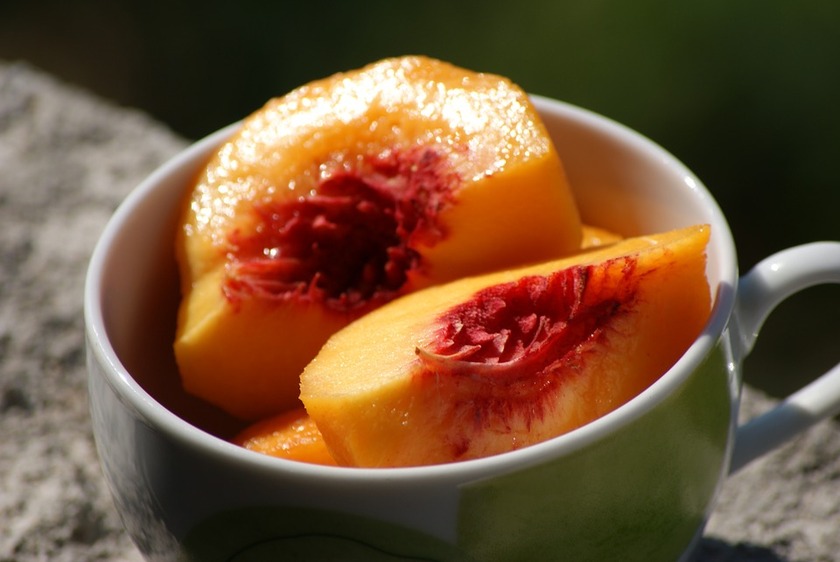
Peach trees have a relatively short lifespan compared to other fruit trees and are sometimes replanted after 8-10 years. They do not tolerate intense cold but do not grow satisfactorily even where the winters are too mild: most varieties require some winter cool to grow after their annual dormancy period.
The leaves are shiny green, pointed, and the famous peach blossoms are arranged singly or in groups along the growth buds of the previous season. They show five petals, usually pink but sometimes white.
The fruit of the peach develops from a single ovary, which matures both in a fleshy and juicy exterior (the edible part of the fruit) and in the hard core, which contains the seeds.
The pulp can be white, yellow or red, also according to the peach varieties, which can be with pits that easily separate from the ripe pulp, or with the pulp that adheres firmly to the pit. The skin of the ripest peaches is hairy, while the smooth-skinned peaches are called nectarines.
Both white and yellow pulp varieties are popular in Europe, while the latter are preferred in North America.
Nutritional values of dehydrated peaches in wedges
Peaches offer vitamins and minerals, especially B vitamins. They are fruits rich in antioxidants, beneficial plant compounds that fight oxidative damage and help protect the body from aging.
This version of dried dehydrated peach wedges contains different sugars and not excessive calories (about 350 per 100 grams), as well as a good content of minerals, fibers (about 8 g / 100 g) and proteins (3.61 g / 100 g).
The peach fruit contains vitamin C (5 mg / 100 g) and Vitamin A (about 105 mcg / 100 g | 2163 IU), riboflavin (about 0.2 mg / 100 g), niacin (about 4, 5 mcg / 100 g), Vitamin B6 (about 0.1 mg / 100 g) and Vitamin K (about 15 mcg / 100 g).
Among the various minerals present there are magnesium, good levels of phosphorus (about 120 mg / 100 g), zinc (0.6 mg / 100 g), calcium (about 28 mg / 100 g), iron (about 4 g / 100 g), potassium (about 990 mg / 100 g), magnesium (about 40 mg / 100 g), copper (about 0.4 mg / 100 g), manganese (about 0.3 mg / 100 g) , and selenium (about 0.5 mcg / 100 g).
Peaches, therefore, are rich in many vitamins, minerals and beneficial plant compounds such as pantothenic acid (0.6 mg / 100 g), choline (about 12 mg / 100 g), and folic acid (about 4 µg / 100 g).
How to consume or use dehydrated sliced peaches in the kitchen
Among dried fruit, a dose of dried peaches can become a beneficial energy snack rich in antioxidants, especially suitable for athletes. Excellent in low-calorie diets as a hunger-breaker, a handful of sliced peaches is sated thanks to the fiber and its intense flavor.
Dehydrated sliced peaches can be easily inserted into salads, dried fruit mixes, for breakfast or snacks, yogurt, fruit salads, and as top decorations on ice cream, muffins, cupcakes and cakes.
Peaches in wedges can also be used as ingredients of dried fruit for desserts and energy bars, given the excellent intake of fiber and carbohydrates.
The dehydrated peach wedges can also be useful for cocktail decorations, or for dishes in which the sweet taste of this fruit goes well with other flavors.
Dehydrated peaches: side effects and contraindications
There are few contraindications to taking dried peaches in the correct quantities, unless there is an intolerance or allergy to the food. Some people may be allergic to peach fuzz.
People suffering from diabetes should avoid excessive use of dehydrated peach wedges, due to the possibility of an increase in blood sugar, due to
![]()

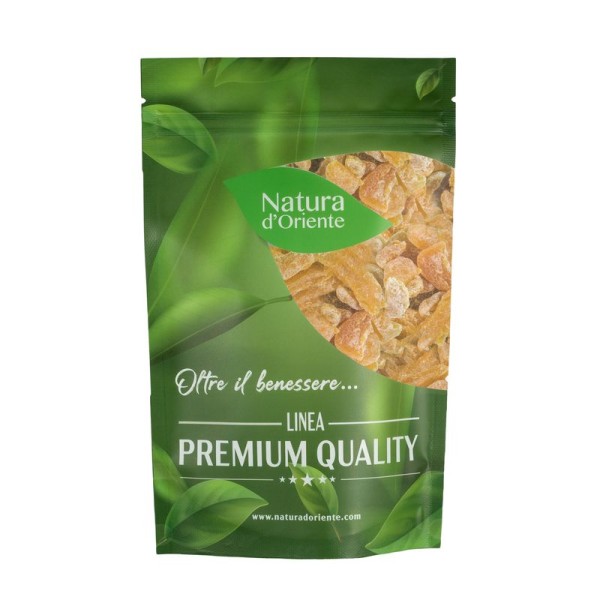









 No reward points for this product.
No reward points for this product.

